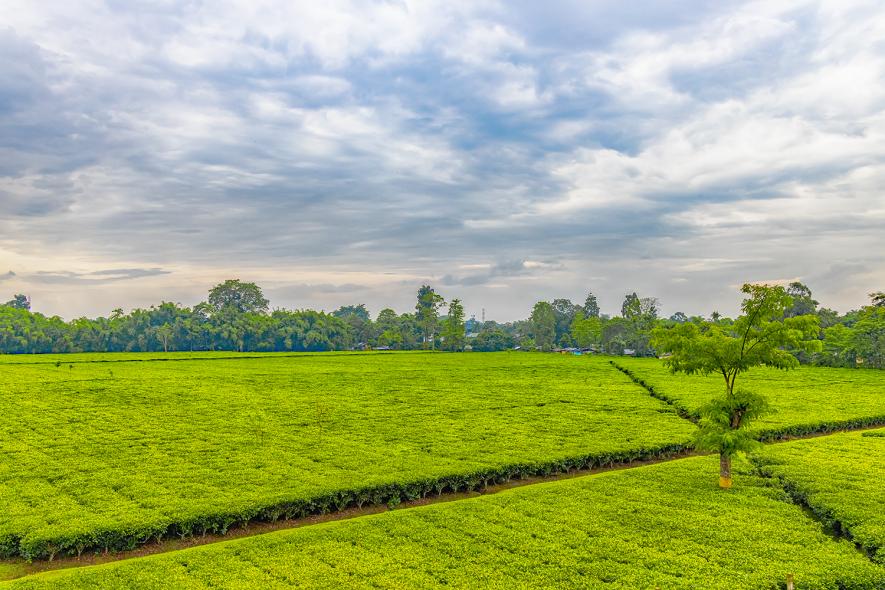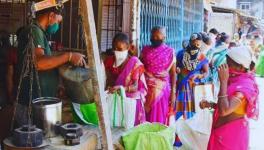COVID-19 in Rural India - IX: Tamuli Gaon Stares at Long-Term Uncertainty as Tea Plucking Grinds to Halt

Image Used for Representational Purpose Only
This is the ninth report in a series that provides glimpses into the impact of COVID-19-related policies on life in rural India. The series, commissioned by the Society for Social and Economic Research, comprises reports by various scholars who have been conducting village studies in different parts of India. The reports have been prepared on the basis of telephonic interviews with key informants in their study villages. This report assesses the ground situation in Tamuli Gaon, Assam, where tea and vegetable growers as also workers are reeling under crisis. Apart from immediate job losses due to the halt in tea plucking, what faces the workers is an uncertain future.
Since the 1970s, small-scale tea cultivation outside tea estates has ‘revolutionised’ the countryside of Upper Assam and the Himalayan foothills in Northeast India. Tea is now the primary crop grown by farmers in many villages in Upper Assam. Tea cultivation has also formed a direct linkage between these villages and the international market.
The current COVID-19 pandemic and the nationwide lockdown declared in India at the end of March have thus had a significant impact on the economies of villages in upper Assam. This report examines this impact in the context of a village named Tamuli Gaon in the district of Golaghat. Information for the report was gathered via telephonic interviews conducted with respondents in the village.
Udayan Rajkhowa, a marginal tea farmer in Tamuli calculates that, even if the lockdown is lifted at the end of April, he is facing a loss of at least Rs 6,000 per bigha of his tea plantation. Since the lockdown began, tea factories that process the green tea leaves collected from nearby villages, known as ‘bought leaf factories’ (BLF), have been temporarily closed. The agents who collect the harvested leaves and take them to tea processing factories have stopped coming to the villages. As a result, the plucking of tea leaves has also stopped.
These events have created an immediate economic crisis for tea farmers. The agents also act as retailers and suppliers of fertilisers, pesticides, and insecticides for tea farmers, as well as sometimes providing advice. Since they have stopped travelling to the villages, farmers are unable to apply the seasonal dose of fertilisers and other nutrients. Rajkhowa reports that even if the lockdown is lifted on April 14, it will take a longer time than usual for the fertiliser to reach villages as the entire supply chain is frozen. At present, fertilisers come mainly from outside the state.
Apart from immediate losses, a longer term impact on tea farmers is anticipated. In the tea business, it is the youngest leaves that fetch farmers the highest prices. A three-week delay in plucking leaves affects the normal cycle of plucking. By the time lockdown is lifted, the buds will have grown too large, requiring the farmers to prune the trees, and forcing them to wait for another month to get a viable quantity of good quality green tea leaves.
The lockdown may also cause a delay to the cycle of pruning in the season in which it must be carried out. Some tea farmers in other villages are trying to mitigate this by using family labour to pluck the leaves, but their family members are often untrained. News that the tea industry will be allowed to resume functioning from April had given the farmers some hope, but this has not happened yet.
Many tea farmers, especially those who have tea plantations big enough to need hired work almost every day, enter into year-long contracts with long-term hired workers. These long-term hired workers are mostly from the adivasi or tea garden communities. The verbal contract includes an understanding that workers will be given shelter and food and that some other basic needs will be fulfilled in addition to them receiving a small money wage.
The tea farmers who have hired workers under such an arrangement have to continue paying, feeding and housing them despite the losses they are incurring due to the lockdown. However, other workers who work for piece-rates or daily wages are currently without work or wages, and have no means to buy food.
With very few public works, such as the construction of rural roads, digging of ponds or the cutting of canals for irrigation, having been undertaken in Tamuli Gaon or neighbouring areas, the number of workdays available under the rural job guarantee scheme, MGNREGA, has been very low. Work under the scheme has completely halted during the lockdown.
In the past, tea plucking or working with an agent (driving vans, loading and unloading tean, or record-keeping) were the main sources of non-farm employment for households in the village. With the lockdown, leaf plucking and all work related to the marketing of tea leaves have also halted. Given the uncertainty over the duration of the lockdown and resumption of operations of tea factories, farmers are not hiring workers and are choosing to save whatever money they have.
As severe as the impact of the lockdown is on tea farmers, seasonal commercial vegetable farmers are having an even tougher time.
Satya Chetri (name changed), a vegetable farmer in the riparian zone of the Doyang River near Tamuli Gaon said, “We are worst hit by this lockdown. Paddy farmers have already harvested, and they can store. Same with those who cultivated pulses. But, peasants like us who produce perishable products are devastated.” Satya has no access to a cold storage facility.
The district administration has allowed vegetable farmers to engage in door-to-door sales provided they do not hike their prices, but the demand is not high enough for farmers to be able to sell all their stock. This is a region in which the large-scale commercial farming of vegetables is undertaken; farmers have had to feed part of their harvest to cattle or worse, throw much of it away as there is no way to transport it to be sold elsewhere in the district. This has resulted in devastating losses for vegetable farmers.
The cattle kept by villagers are fed from resources usually fed on plants grown either within homesteads or on rural commons like grazing lands; there is seldom an absolute shortage of feed for animals to sustain themselves on. Moreover, since the paddy crop has already been harvested, many households have stocks of straw available as animal feed. Although there is a provision for providing wheat bran for use as cattle feed at RS 6/kilos through the public distribution system in Assam, this has never been provided in Tamuli Gaon.
Many in the village have travelled outside Assam for work, to states like Kerala and Tamil Nadu where the wages are higher and employment opportunities are better than in Assam. Many of these workers returned to the village just before the lockdown began, as the news of the pandemic spread. That has created fear among the villagers. All these returned migrants have been kept isolated though nobody has been tested. There are some rumours that have spread in the village about the returned migrants.
In an adjacent village, a young male migrant, who returned from Kerala, has a fever and cough. Villagers called the emergency ambulance number (108) but they refused to come as the driver and the attendant lacked safety equipment. The villagers then contacted the District Commissioner, who promised to send a medical team. However, only a local ANM nurse was asked to visit. For fear that she would lose her job if she did not comply, she visited the house but passed a thermometer tied to a long bamboo stick to the boy and asked him to check his temperature. People in the village still do not know whether or not this person has been infected with the SARS-CoV-2 virus.
The local market is closed except for the pharmacy, and one PDS shop (called ‘Aamar Dokan’) is open from 10 a.m to 4 p.m on weekdays. Cereals, pulses, potato and onion, are available here, irregularly but at the normal PDS prices. The nearest bank is 4 km away. It is open for business, but largely empty due to the absence of public transport and strict action undertaken by police to ensure people are observing the lockdown. Police action has, in fact, been brutal in many places. The news reports of police brutality against three adivasi women (two carrying vegetables on a bicycle and a third carrying firewood) has created an atmosphere of fear, and people are avoiding stepping out.
The tea-growing area of Upper Assam, with a large population of poor peasants, has been a fertile ground for the growth of commercial microfinance companies (MFIs). These companies went door to door and lured people into taking loans that were easy to get and, with a system of EMIs, gave an illusion of carrying low interest. These MFIs give loans to groups of five to ten people, generally women, on the condition that if any member of the group did not repay what was due, the entire group would be disqualified from getting loans in future. This threat forces borrowers to pay their installments without fail, even if they have to sell their assets for it or borrow money to pay installments.
The MFI loans, of amounts ranging from Rs 10,000 to 1.25 lakh (which is the official ceiling by the Reserve Bank of India), carry interest rates of between 20-30% per month. Instalments are collected every week and the interest, if not paid, is compounded weekly. While tea growers and tea pluckers are able to pay these installments if the tea leaves are sold regularly and fetch a good price, the lockdown has put a stop to that regular cashflow. Villagers who were repaying the installments of microfinance loans every week out of their daily wages and income from the sale of tea leaves are now apprehensive of being pushed into a debt trap because of their inability to pay the installments.
The writer is a PhD research student at Centre for Informal Sector and Labour Studies, Jawaharlal Nehru University, Delhi. He earlier stayed in the village for an ethnographic study as a part of PhD field work.
Get the latest reports & analysis with people's perspective on Protests, movements & deep analytical videos, discussions of the current affairs in your Telegram app. Subscribe to NewsClick's Telegram channel & get Real-Time updates on stories, as they get published on our website.
























